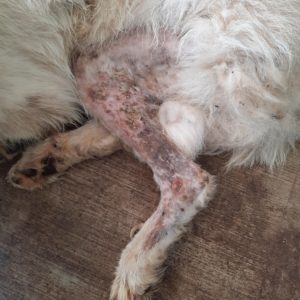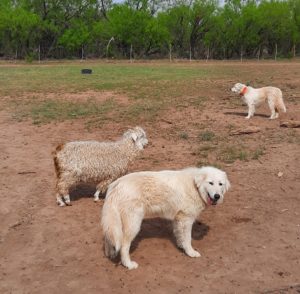AgriLife LGD Program Update
Our next LGD webinar will be held on Thursday, September 23 at 3 p.m. and I will be presenting “Technology to Aid in LGD Management.” You can register for the event on our Facebook page by clicking on the blue “Go To Link” button or on the AgriLife Center’s website under the events section. The webinar will also be broadcast live on Facebook. The video will be recorded and posted to our YouTube Channel also.
Don’t forget to check out the Texas LGD Association’s new website. Membership in the association allows breeders and producers to connect with each other to share information and find LGDs to protect their flocks through the association’s . You can also follow the association on their Facebook page @TexasLGDassociation. The Texas LGD Association will be giving a short presentation and have a table with information at the AgriLife Sheep & Goat Expo on August 20 & 21 in San Angelo.
On October 8 in Fredericksburg, we will be hosting our first in-person field day since the start of the COVID-19 epidemic. Check out our Facebook page for more information on this event in the coming weeks. You can register for the field day by contacting the Gillespie County Extension Office at 830-997-3452 or via email at donna.maxwell@ag.tamu.edu.
LGD Puppy Bonding Project
All the pups in the second round of the bonding project have been placed at our research ranches or at a cooperating producer’s ranch. Doc and Thelma were the last pups to leave the Center in early July. They are doing well and not roaming so far in Menard. In case you missed my previous blogs, both of those pups were roaming after being released from their bonding pen at the Center and had to wear yokes to keep them contained in the correct pasture.
Sadly, in early July, we lost Lenny to an unknown cause. A couple weeks after being placed at a cooperating producer’s ranch with Laverne and Louise he went off feed. He was taken to the local veterinarian and placed on antibiotics due to a high fever. Lenny was unable to fight off the infection he contracted and died two days later. His friendly personality will be missed!
Lenny’s ranch mates Laverne and Louise are doing well without him. Louise roamed to another pasture twice and Laverne followed her a short distance once. The producer is very happy that the dogs have GPS trackers on them, and each time Louise roamed she was quickly found and returned to her correct pasture. By using the GPS trackers, we were able to determine the location the dogs were getting out and some welded wire mesh was added at the bottom of a gate that was hung a little too high.
Wyatt is doing well at the ranch in Ozona with his partner Max. Based on conversations with the ranch foreman the dogs seem to be working well together. They are often separated when I check their GPS trackers, each covering a different group of Angora wethers on the ranch. Squiggy has developed a dry cough and infection in his chest cavity. He was brought back to the Center in mid-July for a few weeks of antibiotics and rest. Hopefully his condition will improve, and he can return to Sonora to finish his training before Queenie retires.
Thor was moved to Menard with some meat goats in early July and has not roamed to date. Hopefully he has outgrown this behavior and will continue to guard his charges at the ranch. Johnny and Waylon are both doing well still. Johnny is still in Menard guarding the Dorper ewes and has been joined by Doc and Thelma to help keep the predators at bay. With the ranch’s pastures being opened for a large research project, we needed to add additional dogs to provide more protection for the stock since they can move across 4,000 acres now.
Waylon is still at the Sonora Station guarding wool sheep. He roamed recently to a neighboring pasture but was returned as soon as he was found. Hopefully it was just a one-time event. Check our Facebook page for recent updates on all the dogs.
LGD Health Tip

Severe infection in Miley’s rear leg from spear grass seeds. (Texas A&M AgriLife photo courtesy Costanzo 2021)
Summer heat can be a challenge for producers using long haired LGD breeds. As summer approaches a variety of grasses release their seeds to regenerate for the next year. These seeds and burrs can get caught in long haired LGD coats and cause extremely bad infections if not removed quickly during this time of the year. All LGDs have a double hair coat that insulates them from temperature swings. However, long haired LGD breeds such as Great Pyrenees and Maremma often need to have their coats brushed out or trimmed to keep them from getting matted with seeds during the late spring and early summer. If this is not done, LGDs in areas of dense brush and grass can develop sores from the seeds all over their body especially on their chest, inner and outer lower legs, lower sides, and bellies. Our veterinarian recommends that the dogs be trimmed to approximately ¼ inch in length in these areas so that seeds and burrs do not get caught in the dog’s hair. It is advised to not slick shear a LGD to bare skin as they can develop a severe sunburn. We prefer to use cordless clippers as they are quieter than corded clippers and the lower noise volume helps keep the dog’s calmer.
If you enjoyed our monthly LGD blog don’t forget to subscribe to it with this link . To provide feedback on this article or request topics for future articles, please contact me at bill.costanzo@ag.tamu.edu or 325-657-7311. The Texas A&M AgriLife Livestock Guardian Dog Program is a cooperative effort by Texas A&M AgriLife Research and the Texas Sheep and Goat Predator Management Board. Make sure to follow us on our social media sites and share them with your friends and family!
Facebook: https://www.facebook.com/TAMUlivestockguarddog/
Instagram: @tamulivestockguarddog
YouTube: https://www.youtube.com/channel/UCF7YbP6bNDV7___6H8mifBA
Don’t forget to check out the Texas LGD Association on online! Follow the organization at https://www.facebook.com/TexasLGDAssociation or check out their website!





